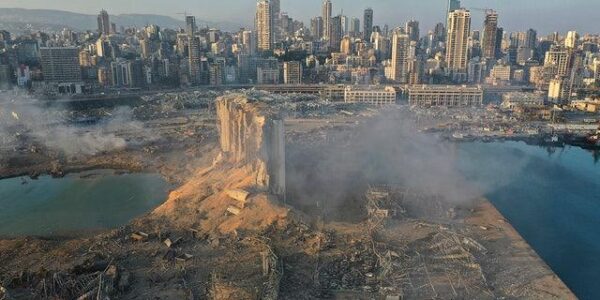
Hezbollah and the Beirut port explosion – nothing changed
It’s been exactly two years since that terrible day when Hezbollah’s 2,750 tons of ammonium nitrate, which were stored in Beirut’s port, suddenly exploded in one of the largest non-nuclear explosions in history and caused massive damage, that destroyed a large part of the city of Beirut.
That day changed Lebanon and brought it aggressively into one of the worst economic crises in the world in the last hundred and fifty years. Furthermore, it revealed the fact that Hezbollah controls every domain in Lebanon and is ready to endanger innocent citizens for its personal strategy and benefits. A chaotic Lebanon serves the Iranian interest for regional hegemony, which is carried out by Hezbollah.
The damage Hezbollah caused that day was enormous:
218 identified people were killed in the explosion not only from Lebanon + more than 30 foreign refugees that were killed or missing, which were harder to detect and identify.
More than 7,000 people were injured, of whom at least 150 suffered physical disability.
The explosion caused critical damage in a radius of ten kilometers to 4,214 vehicles, 3,972 buildings, 77,000 apartments, which turned more than 300,000 homeless – among them 80,000 children.
90% of the hotels in Beirut were severely damaged, as well as cultural and historical sites, more than 100 schools, several embassies, and several hospitals from which three were completely destroyed.
The explosion had a significant impact on 56% of the businesses in Beirut.
15,000 tons of grain were lost, what has left Lebanon with less than a month’s worth of grain in reserve.
Critical damage was caused to city’s infrastructure, including transport, energy, water supply, sanitation, and municipal services totaling 390-475 million USD in losses.
Enormous damage to the port, including ships, hangars, docks, and companies’ offices, as well as to the terminal buildings in Beirut international airport.
According to the World Bank, the explosion caused an estimated 4.6 billion USD in material damage, with estimated losses in total around 15 billion USD.
The “investigation”
The investigation that was led first by investigative judge Fadi Sawan and later replaced by investigative judge Tarek Bitar (due to Hezbollah’s pressure), did point out several figures as responsible for knowing and allowing the storage of the ammonium nitrate in Beirut’s port, while dismissing the danger it contains with it. Not surprisingly, due to the immunity that comes from their political positions, and the connections to Hezbollah, none of them has been interrogated yet, even after lifting their immunity.
Probably the main two suspected politicians are: former finance minister Ali Hassan Khalil and former public works and transport minister Ghazi Zeaiter.
Both judges Sawan and Bitar who tried to expose the truth about the case, received hundreds of immediate threats to their life and family members’ life. Lokman Slim, a Lebanese publisher, and political activist, was assassinated by Hezbollah due to criticism he published blaming them for the explosion and the economic catastrophe that came after it.
The investigation has been suspended more than 25 times due to legal papers submitted to Lebanese court by the suspected politicians (Hezbollah’s leadership orders). The last suspension is still on since 23rd of December 2021.
Now it is already clear that the Lebanese law institutes will not be able to conduct this investigation domestically due to violations of elementary international conventions. Human rights institutes are now putting pressure on the UN to take more practical measures and to deliver justice to Lebanon, especially to the families of the victims.
Hezbollah has been using ammonium nitrate for decades for its terrorist attacks. Hezbollah’s leadership and all those involved knew exactly how dangerous it is, and how big will be the damage to the Lebanese people if something will go wrong.
Today, Hezbollah keep buying and storing ammonium nitrate in several places in Lebanon, including Beirut industrial zone.
According to our information in the beginning of 2022 leadership meeting took place in one the Dahieh. The purpose of the meeting was to deliver additional 4,000 tons of ammonium nitrate to Lebanon for future operations. The storing location will be in the port of Tripoli, in the north of the country, so in any case of trouble, Hezbollah will be ruled out. The meeting took place after an approval of the Shura council, nine days earlier. At the meeting were present five senior characters in Hezbollah’s Jihad council and special unit 910:
Hashem Safieddine – de facto number two in Hezbollah chain of command member of Shura council and Jihad council, head of Executive council.
Wafiq Safa – special mission man, in Nasrallah’s close circle and connected to Hezbollah’s top financiers. In charge of the Liaison and Coordination Unit and is responsible for the coordination with the Lebanese security agencies and army. Head of Hezbollah security apparatus. Member of the Jihad council.
Fouad Shukur – Member of the Jihad council. Shukr is a senior advisor on military affairs to Nasrallah and had a central role in terror attacks in the past.
Talal Hamiyah – head of 910 unit. Involved in Hezbollah’s deadliest terror actions, including in Argentina.
Khaled Kassem – deputy head of 910 unit. Managing the logistics for special operations. He will command the operation in the field. Involved in Hezbollah’s deadliest terror actions, including in Argentina.
The five also agreed on all the names of the people that will be exposed to this secret plan.
Hezbollah continues to operate in terroristic methods towards the Lebanese people as it acted before and since the explosion in Beirut’s port in August 2020. This serves all its basic needs. Nasrallah doesn’t care as long as the organizations’ need are fulfilled. The next disaster can happen any day soon.
![]()




